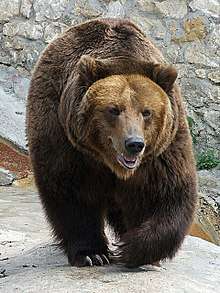
Bears are mammals of the family Ursidae. Bears are classified as caniforms, or doglike carnivorans, with the pinnipeds being their closest living relatives. Although there are only eight living species of bear, they are widespread, appearing in a wide variety of habitats throughout the Northern Hemisphere and partially in the Southern Hemisphere. Bears are found in the continents of North America, South America, Europe, and Asia. Common characteristics of modern bears include a large body with stocky legs, a long snout, shaggy hair, plantigrade paws with five nonretractile claws, and a short tail. While the polar bear is mostly carnivorous and the giant panda feeds almost entirely on bamboo, the remaining six species are omnivorous, with largely varied diets including both plants and animals.
With the exceptions of courting individuals and mothers with their young, bears are typically solitary animals. They are generally diurnal, but may be active during the night (nocturnal) or twilight (crepuscular), particularly around humans. Bears are aided by an excellent sense of smell, and despite their heavy build and awkward gait, they can run quickly and are adept climbers and swimmers. In autumn some bear species forage large amounts of fermented fruits which affects their behavior. Bears use shelters such as caves and burrows as their dens, which are occupied by most species during the winter for a long period of sleep similar to hibernation. Bears have been hunted since prehistoric times for their meat and fur. To this day, they play a prominent role in the arts, mythology, and other cultural aspects of various human societies. In modern times, the bear's existence has been pressured through the encroachment on its habitats and the illegal trade of bears and bear parts.
Quotes
- Man is a great blunderer going about in the woods, and there is no other except the bear makes so much noise.
- Mary Austin, The Land of Little Rain (1903), p. 60.
- Not unlike the bear which bringeth forth
In the end of thirty dayes a shapeless birth;
But after licking, it in shape she drawes,
And by degrees she fashions out the pawes,
The head, and neck, and finally doth bring
To a perfect beast that first deformed thing.- Guillaume de Salluste Du Bartas, La Semaine; ou, Création du monde (1578), First Week, First Day. Compare: "I had not time to lick it into form, as a bear doth her young ones", Robert Burton, Anatomy of Melancholy. Democritus to the Reader.
- Make ye no truce with Adam-zad—the Bear that walks like a man.
- Rudyard Kipling, The Truce of the Bear; reported in Hoyt's New Cyclopedia Of Practical Quotations (1922), p. 57.
- The Puritan hated bear-baiting, not because it gave pain to the bear, but because it gave pleasure to the spectators.
- Thomas Macaulay, History of England (1849-1861), Volume I, chapter 3.
- And he went up from thence unto Bethel: and as he was going up by the way, there came forth little children out of the city, and mocked him, and said unto him, Go up, thou bald head; go up, thou bald head. And he turned back, and looked on them, and cursed them in the name of the LORD. And there came forth two she bears out of the wood, and tare forty and two children of them.
- 2 Kings 2:23-25.
- Magnificent bears of the Sierra are worthy of their magnificent homes. They are not companions of men, but children of God, and His charity is broad enough for bears. They are the objects of His tender keeping.
- John Muir, reported in Linnie Marsh Wolfe, John of the Mountains: the Unpublished Journals of John Muir (1938), p. 82.
- Bears are made of the same dust as we, and breathe the same winds and drink of the same waters. A bear's days are warmed by the same sun, his dwellings are overdomed by the same blue sky, and his life turns and ebbs with heart-pulsings like ours, and was poured from the same First Fountain. And whether he at last goes to our stingy heaven or no, he has terrestrial immortality. His life not long, not short, knows no beginning, no ending.
- John Muir, reported in Linnie Marsh Wolfe, John of the Mountains: the Unpublished Journals of John Muir (1938), p. 82-83.
- Some days you get the bear. Some days the bear gets you.
- Proverb, origin unknown. Reported in, inter alia, Josh Pons, Country Life Diary (1992), p. 6.